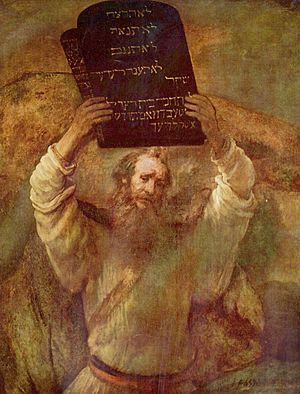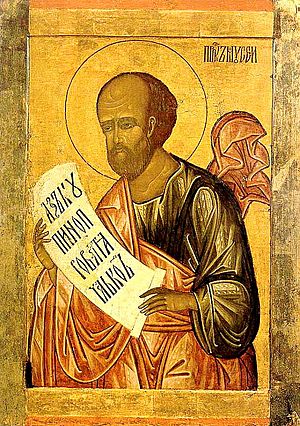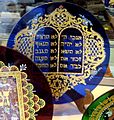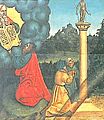Ten Commandments facts for kids

The Ten Commandments are a set of rules or laws. God gave them to the people of Israel. The commandments exist in different versions. One version can be found in the Book of Exodus of the Bible. Another version can be found in the Book of Deuteronomy . In the Book of Exodus, the mountain where they were given is called Mount Sinai, the Book of Deuteronomy talks about Mount Horeb. Both are probably different names for the same mountain. The rules were written on stone tablets. These rules are important for Judaism and Christianity. Countries which follow those religions have some of the commandments as part of their Civil laws.
Sometimes these rules are also called Decalogue (from Greek, can be translated as ten statements). The name decalogue first occurs in the Septuagint. The Israelites received the commandments after they had left Egypt during the reign of Pharaoh Thutmose. There are different texts talking about the commandments. Most of them are in the Bible: The Book of Exodus, Chapter 20 and the book of Deuteronomy, Chapter 5. The Qu'ran mentions the tablets but does not list exactly the same commandments. For instance Quran 17:23-39 starts with worshipping God alone and honouring your parents.
Contents
The Ten Commandments
The Ten Commandments are
- Do not have any other god before God.
- Do not make yourself an idol.
- Do not take the Lord's name in vain.
- Honor thy Father and thy Mother
- Keep the sabbath day holy
- Do not murder.
- Do not commit adultery.
- Do not steal.
- Do not testify false witness against your neighbor.
- Do not covet.
In the Bible
The Bible in Basic English translates the commandments from Exodus in this way:
- And God said all these words: I am the Lord took you out of the land of Egypt, out of the prison-house. You are to have no other gods but me.
- You are not to make an image or picture of anything in heaven or on the earth or in the waters under the earth: You may not go down on your faces before them or give them worship: for I, the Lord your God, am a God who will not give his honour to another; and I will send punishment on the children for the wrongdoing of their fathers, to the third and fourth generation of my haters; And I will have mercy through a thousand generations on those who have love for me and keep my laws.
- You are not to make use of the name of the Lord your God for an evil purpose; whoever takes the Lord's name on his lips for an evil purpose will be judged a sinner by the Lord
- Keep in memory the Sabbath and let it be a holy day. On six days do all your work: But the seventh day is a Sabbath to the Lord your God; on that day you are to do no work, you or your son or your daughter, your man-servant or your woman-servant, your cattle or the man from a strange country who is living among you: For in six days the Lord made heaven and earth, and the sea, and everything in them, and he took his rest on the seventh day: for this reason the Lord has given his blessing to the seventh day and made it holy.
- Give honour to your father and to your mother, so that your life may be long in the land which the Lord your God is giving you.
- Do not put anyone to death without cause.
- Do not be false to the married relation.
- Do not take the property of another.
- Do not give false witness against your neighbour.
- Let not your desire be turned to your neighbour's house, or his wife or his man-servant or his woman-servant or his ox or his ass or anything which is his.
Muslim understanding
Islam teaches that the Bible is a revelation from God, but that the text used in Judaism and Christianity has been corrupted. The Ten Commandments are not explicitly mentioned in the Qur'an, but each is implied by the following verses in the Quran.
- "There is no other god beside God."
- "My Lord, make this a peaceful land, and protect me and my children from worshiping idols." ()
- "Do not subject God's name to your casual swearing, that you may appear righteous, pious, or to get credibility among the people."
- "O you who believe, when the Congregational Prayer (Salat Al-Jumu`ah) is announced on Friday, you shall hasten to the commemoration of GOD, and drop all business."
- "....and your parents shall be honored. As long as one or both of them live, you shall never say to them, "Uff" (the slightest gesture of annoyance), nor shall you shout at them; you shall treat them amicably."
- "....anyone who murders any person who had not committed murder or horrendous crimes, it shall be as if he murdered all the people."
- "You shall not commit adultery; it is a gross sin, and an evil behavior."
- "The thief, male or female, you shall mark their hands as a punishment for their crime, and to serve as an example from God. God is Almighty, Most Wise."
- "Do not withhold any testimony by concealing what you had witnessed. Anyone who withholds a testimony is sinful at heart."
- "And do not want what we bestowed upon any other people. Such are temporary ornaments of this life, whereby we put them to the test. What your Lord provides for you is far better, and everlasting."
Other religions
In general, religions other than those mentioned (Judaism, Christianity, Islam) do not recognise the Ten Commandments as ethical standards. Many of them (Buddhism, Hinduism, Jainism, etc.) have similar laws or principles though. In the atheist Soviet Union the Moral Code of the Builder of Communism was a set of rules that resembled the Ten Commandments.
| Ten Commandments | Buddhist Five Precepts |
|---|---|
| I am the Lord your God | |
| You shall have no other gods before me | |
| You shall not make for yourself an idol | |
| You shall not make wrongful use of the name of your God | |
| Remember the Sabbath and keep it holy | |
| Honor your Father and Mother | |
| You shall not murder | abstain from hurting and killing both human and animals |
| You shall not commit adultery | |
| You shall not covet your neighbor's wife | |
| You shall not steal | abstain from taking what is not given (e.g. stealing, displacements that may cause misunderstandings) |
| You shall not covet your neighbor's house | |
| You shall not bear false witness against your neighbor | abstain from bad speech (e.g. telling lies, hurting words, deceiving, manipulating) |
| abstain from intoxicating drugs and drinks which lead to carelessness |
The Ritual Decalogue
The term "Ten Commandments" generally applies to the list mentioned in Exodus 20 and Deuteronomy 5. However, there is a continuous story being told starting in Exodus 31:18 (where the stones are created), Exodus 32:19 (where the tablets are broken) and Exodus 34. This story lists a very different set of commandments. This version is sometimes called "Ritual Decalogue". Johann Wolfgang von Goethe and the people after him who followed the documentary hypothesis, note that Exodus 34:28 seems to refer to these Ten Commandments rather than the traditional ones. These people thought that the commandments in Exodus 20 and Deuteronomy 5 show a later set of Ten Commandments, and that the ten listed in Exodus 34 were the original Ten Commandments, now known as the Ritual Decalogue (as opposed to the better-known "Ethical Decalogue"). The differences between the two Decalogues highlight the development of sacred texts over a long time and from differing narrative traditions by incorporating two differing sets of Ten Commandments.
Influence
The commandments have influenced Jewish ethics and law and, through Judaism and Christianity, Western ethics and law since the Roman Empire. Moses is the founder of basis of the philosophy of law as well as such modern legal doctrines as independent judiciary and separation of powers.
In the Arts
Film
There have been two famous films of this name; both were directed by Cecil B. DeMille, a silent movie in 1923, and a movie in 1956, starring Charlton Heston as Moses. That one was the biggest money-making movie that year.
Images for kids
-
The Sixth Commandment, as translated by the Book of Common Prayer (1549).The image is from the altar screen of the Temple Church near the Law Courts in London.
-
Ten Commandments display at the Texas State Capitol in Austin.
-
The Ten Commandments by Lucas Cranach the Elder in the townhall of Wittenberg, (detail)
See also
 In Spanish: Diez Mandamientos para niños
In Spanish: Diez Mandamientos para niños







